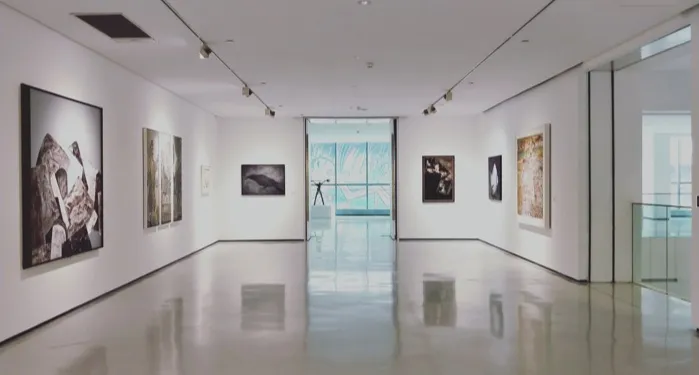
New No-fee Ekphrastic Poetry Prize for Teens and Adults
In mid-August, the Barjeel Art Foundation launched its first-ever “Barjeel Poetry Prize.” The new poetry prize has six categories, in two languages, for teens and adults. It asks poets to respond to 20 works of Arab art from the 20th century.
What’s Ekphrasis?
According to the Poetry Foundation, the word “ekphrasis” (which WordPress keeps trying to autocorrect to “emphasis”) comes from the Greek word for “description.” An ekphrastic poem, they write, “is a vivid description of a scene or, more commonly, a work of art.”
The most famous example is probably John Keats’s “Ode on a Grecian Urn.” But the Poetry Foundation also has a long listing of other poems inspired by art from around the world.
For instance, Orlando Ricardo Menes writes a poem to Sin Título, from the series The Tempest, 1998, by Arturo Rodríguez. The poem is titled “Altar Boy.” It opens:
I am the altar boy with feet flattened by the catechist’s paddle, my skin toasted like stalks of sugarcane at Lent, my shorts baptized in the salt pans of saints.
Ekphrastic poetry brings together visual and poetic worlds, bringing both poetry and art to new audiences. Museums and galleries have also engaged artists to engage with poems. The 2016 exhibition “Night and the Desert Know Me” asked artists to respond to a series of Iraqi poems.
Other ekphrastic poetry prizes include the “Artylst Prize” and the “Ekphrastic Poetry Contest” from the Toledo Museum of Art. Both are currently closed to entries.
Turning Arab Art into Poetry
The new Barjeel prize asks poets to respond to one of 20 works of Arab art from around the region. These range from Hassan Sharif’s abstract “Black and White” to Ingy Aflatoun’s “Dreams of the Detainee,” part of a series where she painted herself in prison.
Some of the works are crowded with city life while others are starkly empty. Huguette Caland’s “Body Parts” is a minimalist curve of seated buttocks.
The Barjeel Prize is open through the end of September. The six categories are:
1) Arabic-language poem (adult), judged by poet Asmaa Azaizeh
2) Arabic-language poem (14-18), judged by poet Golan Haji
3) English-language poem by authors of Arab heritage (adult), judged by poet Hala Alyan
4) English-language poem by authors of Arab heritage (14-18), judged by poet Naomi Shihab Nye
5) English-language poem by authors internationally (adult), judged by poet Tishani Doshi
6) English-language poem by authors internationally (14-18), judged by poet Raymond Antrobus
Each category will have a $500 first-prize winner and a $250 runner-up. The winning poems will also be published in the literary magazine Rusted Radishes and displayed in the Barjeel museum. There also will likely be a future chapbook and events, showcasing the poems.
Winners are set to be announced the first week of December, 2020.
In the Classroom: Getting Started with an Ekphrastic Poem
If you’re a teacher or instructor—or new to poetry—there are a number of sites to help prompt an ekphrastic poem.
Martyn Crucefyx lists “14 Ways to Write an Ekphrastic Poem.” This list includes both poems and examples of art. The suggestions begin with description. But they also take the poet through research, ventriloquism, interrogation, and “giving an account.”
There’s another helpful list from Molly Spencer, who says she was informed by “A Question of Attraction: Ekphrasis” by Madelyn Garner and Andrea L. Watson in Wingbeats. She also credits “a workshop on ekphrastic art I took from Sally Ashton.”
The Yale National Initiative even offers a breakdown of how to introduce ekphrastic poetry into the classroom. The resource, put together by Kristen S. Kurzawski, suggests that the “wonderful thing about ekphrastic poetry is that it easily leads into a dialogue about the form and function of a poem and its components.”
What next?
If you’re interested in trying your hand at an ekphrastic poem, first view the 20 works of art on the Barjeel website. There, you can either choose a work of art or, as Spencer suggests, you can wait for the art to choose you.
Once you’ve sat with your artwork, check out the Barjeel Poetry Prize submission guidelines. And good luck!




